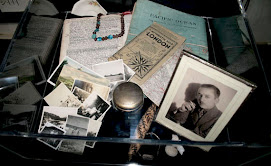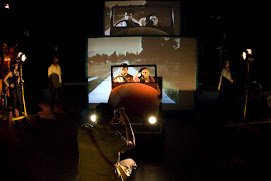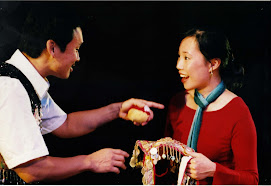Following on from something in my previous post—the relatively limited dramaturgy available in this country to writers at the less traditional or more experimental end of the theatrical spectrum, I received an email about Dramaturgies #4 an event taking place in Melbourne in February 2010. Here's what they say:
'Dramaturgies #4 will be a national gathering of artists and arts thinkers working over three intensive days to explore new ecologies for dramaturgical practice as we face the challenges posed by shifting theatrical forms in the twenty-first century. The gathering will include daily working groups to discuss specific questions of dramaturgical practice that require a detailed examination and response … '
Here’s what I’d ask: If hybridity is the destiny of our 21st century world—and I think the jury is still out on that, for every trend there is a counter-trend, etc., etc.—then what kinds of dramaturgical ideas and strategies do we need to develop for the modular script? For transcultural, bi-lingual and multi-lingual writing? To deal with open texts, site specific theatre and promenade pieces? With flash mobs, spoken word and the many and various forms of solo performance? With emerging music-theatre genres, with web-based, online and games-inspired forms? What happens to a story when mobile technology takes your writing outside the theatre space? How does the architecture of a place shape or subsume your narrative, determine characters, amplify voices, cast its shadow on the way you write? What happens when your ‘stage’ is full of unrehearsed passers-by, subject to inclement weather and random happenings?
Sounds like Dramaturgies #4 is going to address some of these issues.
For more info or to register your interest, go to their website: http://www.dramaturgies.net/.
17 November 2009
15 November 2009
Enough with the 'Shoulds'
I’ve been working on Random Red, a radio drama script, the brief for which is to revisit an old text in some way. Text is interpreted very broadly—it could be anything from a novel to an inscription on a gravestone—but it does have to predate the invention of radio. And my use of this text is equally open, so it can be an adaptation, an audacious reworking, or I can simply use the original text as a springboard to something else.
After a couple of false starts I decided that my old text would be Isaac Newton’s early notebooks, in particular his 1659 notebook with its colour recipes. Newton's interest in colour was enduring; he is famously the man who unwove the rainbow, and fractured light into its 7 constituent colours.
I got carried away, reading biographies, books about the history of colour, of calculus, of alchemy and astronomy. I carried out research in Cambridge and London during my stay in England. The only problem was, everything I read branched out into more possibilities, more tantalising leads to investigate. Which meant I arrived at a point where I had enough material and ideas for half a dozen scripts—but no clear story world for the one I’d been commissioned to write. This no doubt reveals something (perhaps rather too much?) about my writing process, but it’s a situation in which I often find myself. On the up-side however, I’ve found some of my best ideas while immersed in research for other projects.
I’m not, and never have been, a writer who plans out their script before they write it. I usually start with a collection of ideas, themes and metaphors. Sometimes with a musical form. Occasionally with a character or characters. Rarely with a detailed narrative. Never with plot. I begin writing to discover what it is I’m actually writing about. This time I began with 2 things. A form or style: I wanted to combine narrative and real-time dialogue, and a hazy sense of one character: I knew he was male, well into middle-age, and some kind of scientist. As points of departure go, this is loose and vague—even for me. So, not surprisingly, the writing has been stop-start.
All this is by way of a (long) preamble to explaining why I’ve read a lot of theatre reviews and blogs this last week. And been dismayed (and exasperated) by the overuse of one of my least favourite words: ‘Should’. Especially when directed at playwrights. Too many critics, bloggers, whoever and their dogs, telling playwrights how they should write and what their plays should do. Why do playwrights cop so much of this? No one seems to tell actors how they should act or designers what they should design to anything like the same degree. But it seems par for the course to bombard playwrights with ‘shoulds’.
Bit of an aside: why have we adopted this medical terminology of ‘script clinics’, ‘script doctors’, etc.? One London theatre company recently sent out a newsletter promoting their script clinic with a big red cross and the question: Is your writing practice in need of a check-up? What message does this give playwrights? All it does for me is conjure up the ridiculous image of a waiting room full of sick and bleeding plays.
Back to the ‘shoulds’. First reaction is that I’d like to tell those dispensing these pearls to stop telling us what we should do and write their own damn plays! A second, calmer, response is that question: why do playwrights get so much advice? Collective insecurity? The need to court those who program? Getting carried away by the collaborative nature of our work? Or perhaps it’s because, unlike say, playing the cello or performing somersaults on the trapeze, everyone feels they can write? Anyway, whatever the reason/s, I think a contributing factor is the notion of ‘rules’. Personally, when I hear the word ‘rules’ I run for the door. No, but seriously, the problem I have with ‘rules’ is (a). that they are predicated on the assumption that there is some universal notion of the perfect play, to which we all subscribe, (b). that ‘rules’ are not neutral and value-free, but derive from particular traditions and ideologies, and are answerable to certain interests (read the work of Trinh T. Minh-ha and Raúl Ruiz from the 1980s for more on this), and (c). despite what are no doubt the helpful intentions of many script gurus and dramaturgs, rules are often about control and gatekeeping as much as they are about the craft of theatre writing; any work perceived to be ‘breaking the rules’ can be safely shifted to the margins.
Of course this raises issues of dramaturgy, and a recurring preoccupation of mine: the relative lack of dramaturgical strategies and vocabulary for more experimental theatre writing, for work which is not primarily or essentially narrative drama, for work which is not about character arcs and plot progression. But now I’m starting to rant. Enough said.
BTW I’ve almost finished the first draft of Random Red. As for process here’s a favourite quote from Isaac Newton: ‘I keep the subject constantly before me and wait ’till the first dawnings open slowly, by little and little, into a full and clear light.’
After a couple of false starts I decided that my old text would be Isaac Newton’s early notebooks, in particular his 1659 notebook with its colour recipes. Newton's interest in colour was enduring; he is famously the man who unwove the rainbow, and fractured light into its 7 constituent colours.
I got carried away, reading biographies, books about the history of colour, of calculus, of alchemy and astronomy. I carried out research in Cambridge and London during my stay in England. The only problem was, everything I read branched out into more possibilities, more tantalising leads to investigate. Which meant I arrived at a point where I had enough material and ideas for half a dozen scripts—but no clear story world for the one I’d been commissioned to write. This no doubt reveals something (perhaps rather too much?) about my writing process, but it’s a situation in which I often find myself. On the up-side however, I’ve found some of my best ideas while immersed in research for other projects.
I’m not, and never have been, a writer who plans out their script before they write it. I usually start with a collection of ideas, themes and metaphors. Sometimes with a musical form. Occasionally with a character or characters. Rarely with a detailed narrative. Never with plot. I begin writing to discover what it is I’m actually writing about. This time I began with 2 things. A form or style: I wanted to combine narrative and real-time dialogue, and a hazy sense of one character: I knew he was male, well into middle-age, and some kind of scientist. As points of departure go, this is loose and vague—even for me. So, not surprisingly, the writing has been stop-start.
All this is by way of a (long) preamble to explaining why I’ve read a lot of theatre reviews and blogs this last week. And been dismayed (and exasperated) by the overuse of one of my least favourite words: ‘Should’. Especially when directed at playwrights. Too many critics, bloggers, whoever and their dogs, telling playwrights how they should write and what their plays should do. Why do playwrights cop so much of this? No one seems to tell actors how they should act or designers what they should design to anything like the same degree. But it seems par for the course to bombard playwrights with ‘shoulds’.
Bit of an aside: why have we adopted this medical terminology of ‘script clinics’, ‘script doctors’, etc.? One London theatre company recently sent out a newsletter promoting their script clinic with a big red cross and the question: Is your writing practice in need of a check-up? What message does this give playwrights? All it does for me is conjure up the ridiculous image of a waiting room full of sick and bleeding plays.
Back to the ‘shoulds’. First reaction is that I’d like to tell those dispensing these pearls to stop telling us what we should do and write their own damn plays! A second, calmer, response is that question: why do playwrights get so much advice? Collective insecurity? The need to court those who program? Getting carried away by the collaborative nature of our work? Or perhaps it’s because, unlike say, playing the cello or performing somersaults on the trapeze, everyone feels they can write? Anyway, whatever the reason/s, I think a contributing factor is the notion of ‘rules’. Personally, when I hear the word ‘rules’ I run for the door. No, but seriously, the problem I have with ‘rules’ is (a). that they are predicated on the assumption that there is some universal notion of the perfect play, to which we all subscribe, (b). that ‘rules’ are not neutral and value-free, but derive from particular traditions and ideologies, and are answerable to certain interests (read the work of Trinh T. Minh-ha and Raúl Ruiz from the 1980s for more on this), and (c). despite what are no doubt the helpful intentions of many script gurus and dramaturgs, rules are often about control and gatekeeping as much as they are about the craft of theatre writing; any work perceived to be ‘breaking the rules’ can be safely shifted to the margins.
Of course this raises issues of dramaturgy, and a recurring preoccupation of mine: the relative lack of dramaturgical strategies and vocabulary for more experimental theatre writing, for work which is not primarily or essentially narrative drama, for work which is not about character arcs and plot progression. But now I’m starting to rant. Enough said.
BTW I’ve almost finished the first draft of Random Red. As for process here’s a favourite quote from Isaac Newton: ‘I keep the subject constantly before me and wait ’till the first dawnings open slowly, by little and little, into a full and clear light.’
Labels:
dramaturgy,
Isaac Newton,
playwriting,
Random Red,
writing processes
06 November 2009
extempore 3

extempore 3 is out. The journal is edited by Miriam Zolin and this issue includes a bonus CD of contemporary Australian jazz, including a track by the wonderful Way Out West. Their 2002/3 CD Footscray Station remains one of my much-played favourites, and—directly and indirectly—has inspired performance texts, poems and spoken word pieces. You can also read my poem Learning (to love) the clarinet in this issue of extempore.
Subscribe to:
Comments (Atom)
+Photo+Leah+McGirr+3.jpg)



